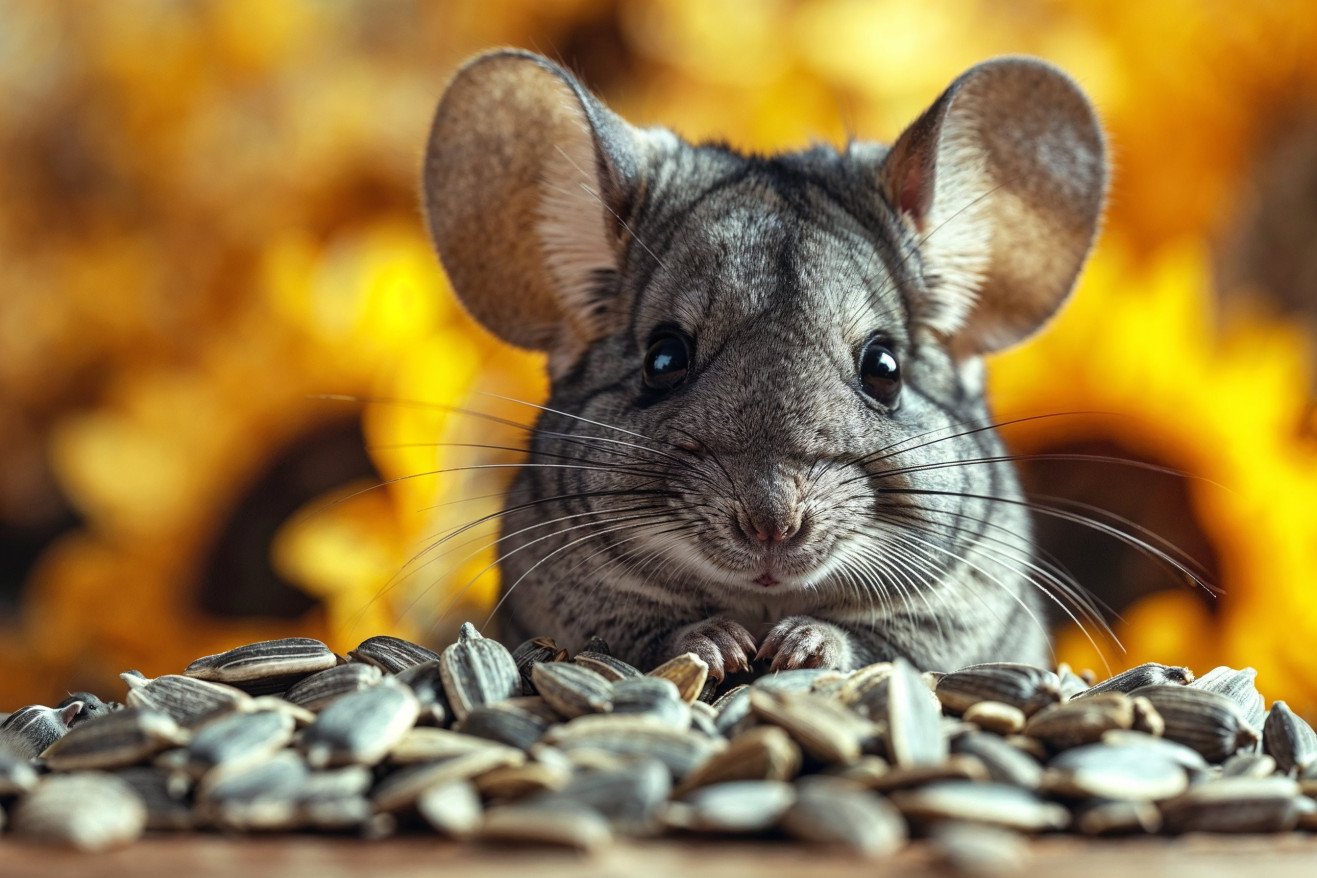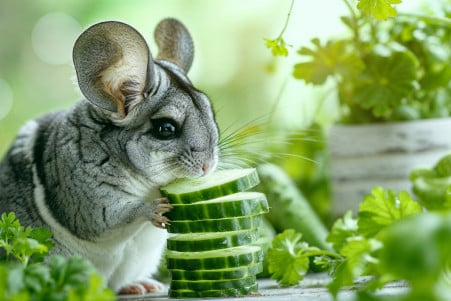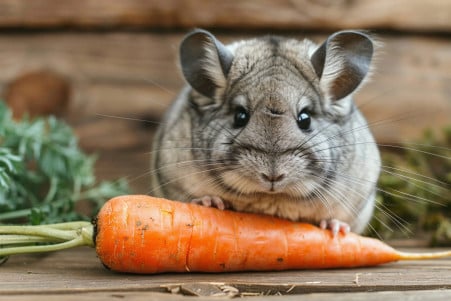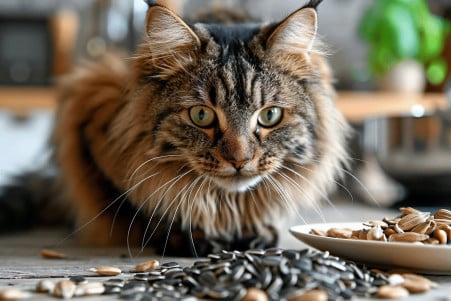Can Chinchillas Eat Sunflower Seeds? A Nutritional Guide
20 January 2024 • Updated 28 January 2024

Small but powerful, sunflower seeds are a nutritional powerhouse, but can chinchillas eat them? Chinchillas can eat sunflower seeds, but they should do so sparingly due to their high fat content, which can lead to weight gain. It’s best to feed them no more than a couple of seeds once a week as part of a well-balanced diet.
In the sections below, we’ll take a deep dive into the ins and outs of chinchilla nutrition, drawing on expert advice, veterinary perspectives, and nutritional research to explain what it means to give chinchillas sunflower seeds.
We’ll also discuss how their specific nutritional needs impact their health and look at other treats that are safer to give them. By the end of this post, you’ll know exactly how to make sure your cute, furry friends are eating right.
Can chinchillas eat sunflower seeds?
Knowing What Chinchillas Need in Their Diet
Chinchillas have specific dietary needs that are important for their overall health and wellness. According to ExoticDirect, these adorable herbivores require a diet that is high in fiber and low in fat and moisture, with an ideal macronutrient breakdown of around 35% carbohydrates, 15% protein, and 30% fiber. This diet will help prevent dental and digestive issues, which can happen if they don’t get enough fiber.
UK Pet Food notes the importance of a controlled diet, warning that chinchillas can become overweight due to too many treats or sugary foods. As a result, hay, with Timothy hay or orchard grass as the main component, should make up the majority of their diet (75–80%) as it helps with digestion and dental care since their teeth never stop growing.
Chinchillas need to have access to fresh, clean water at all times, which is a non-negotiable part of their diet. When it comes to treats, they should be low in fat and sugar and high in fiber. Small Pet Select recommends that new foods be introduced slowly to avoid stomach upset. By following these dietary guidelines, chinchillas can have a diet that meets their needs and supports their natural behaviors.
Sunflower Seeds and the Nutritional Needs of Chinchillas
Sunflower seeds are a popular snack food that is packed with a variety of nutrients, including fats, fiber, and protein, as well as several essential vitamins and minerals. As noted by Healthline, a 1–ounce serving of sunflower seeds contains 14 grams of fat and 3 grams of fiber, as well as 5.5 grams of protein.
While chinchillas can eat sunflower seeds, they are high in fat, including polyunsaturated and monounsaturated fats, and if consumed in large amounts, this can lead to obesity and other health issues.
The vitamins and minerals found in sunflower seeds, such as vitamin E, magnesium, and selenium, are antioxidants that can have positive effects on health.
However, as the University of Rochester Medical Center points out, chinchillas need a low-fat diet, so the fat content of sunflower seeds is a concern. While it’s fine to give chinchillas an occasional sunflower seed as a treat, it’s important to limit the frequency and amount to avoid throwing off their nutritional needs and potentially causing health problems.
Because of the potential downsides, sunflower seeds should be an occasional treat for chinchillas, which is consistent with their need for a high-fiber, low-fat diet. Being mindful of a chinchilla’s diet and treats can help avoid health issues that can result from an unbalanced diet in these delicate animals.
What Happens If a Chinchilla’s Diet Is Not Proper?
Despite their seemingly sturdy appearance, chinchillas are sensitive animals, and their health can be negatively impacted by a diet that is too high in fat and calories. Whimsy’s Menagerie Chinchilla Rescue explains that chinchillas can develop obesity and fatty liver disease, or hepatic lipidosis, from eating high-fat foods like sunflower seeds.
The condition starts with no visible signs and eventually leads to weight loss and emaciation. To avoid these diseases, Small Pet Select recommends feeding chinchillas a diet that is high in fiber and low in fat.
In addition to preventing diseases, a proper diet is also important for maintaining gastrointestinal health. The RSPCA warns that introducing high moisture foods can lead to bloat and other digestive issues in chinchillas, which have sensitive digestive systems. If you notice any changes in your chinchilla’s eating or droppings, which could be signs of a poor diet, it’s important to contact a vet right away.
In addition to preventing health issues, feeding your chinchilla a diet that is in line with their natural dietary needs will help ensure that they are happy and healthy. It’s important to maintain this balance for their overall well-being, and knowing about their unique digestive system will help you make sure that you are taking the best care of them.
Chinchillas’ Specialized Digestive Tract
Chinchillas have a specialized digestive tract that is adapted to their high-fiber diet in the wild. As one study in the “Canadian Journal of Zoology” notes, chinchillas have a high capacity to digest carbohydrates due to specific enzyme activities in their small intestine, while cellulose digestion is mainly carried out in the large intestine.
This is important because, as hindgut fermenters, chinchillas can ferment fibrous plant material in the large intestine to produce volatile fatty acids, which are their main energy source.
On the other hand, their digestive system is not well-equipped to handle high-fat diets. As the study “Retention of solute and particle markers in the digestive tract of chinchillas” in “PubMed” explains, chinchillas have a ‘mucus-trap’ colonic separation mechanism that may be sensitive to high-fat diets, such as those that include sunflower seeds.
This makes a diet that is high in fiber and low in fat important to chinchillas to avoid the health problems that can come with a high-fat diet.
Another important part of their digestion is coprophagy, or the consumption of their own fecal pellets, which allows them to absorb more nutrients from their food. This, as explained in “PubMed,” is a result of their need for a high-fiber diet and ensures they get the right balance of nutrients.
Knowing these physiological facts, we can understand why it’s important for chinchillas to have a diet that closely matches what they eat in the wild, which emphasizes safer treats that can help their health and digestion.
Healthy Treats for Your Chinchilla
While chinchillas can enjoy treats, it’s important to make sure that the treats you’re giving them are in line with their dietary needs. Small Pet Select recommends treats that are high in fiber and low in fat, like dried goji berries and hay cubes, because of their nutritional value and because they don’t come with the risks that high-fat treats do.
UK Pet Food recommends a diet that’s mostly made up of high-quality hay and a small portion of specially formulated chinchilla pellets to make sure that chinchillas get the right balance of nutrients.
Environmental enrichment is important for a chinchilla’s diet and well-being. Foraging enrichment can help chinchillas eat more like they would in the wild and maintain a healthy weight.
Introducing new treats should be done slowly to avoid digestive issues. Keep an eye on your chinchilla’s eating habits, weight, and droppings to ensure their health.
By keeping these healthier treat options and practices in mind, you can ensure your chinchilla’s diet is healthy while still providing variety.
What This Means for Chinchillas and Sunflower Seeds: A Recap
This article has covered the important details of a chinchilla’s diet, focusing on the need for a high-fiber, low-fat, and low-moisture diet to keep them healthy. It has also gone over the nutritional information of sunflower seeds, noting that while they are healthy for humans, their high-fat content can be dangerous for chinchillas if they are consumed in large amounts.
This article has also covered the dangers of an unhealthy diet, including obesity and fatty liver disease, and has stressed the importance of feeding chinchillas treats in moderation and with care. The article has also shown that the chinchilla’s unique digestive system, which has evolved to process high-fiber diets and perform hindgut fermentation, means that their diet needs to be managed even more closely.
By offering alternative treats that are safer for chinchillas, this article has also given ways to make sure that these adorable animals can be fed in ways that won’t harm them.
It’s up to us as pet owners to make sure that our desire to spoil our chinchillas doesn’t outweigh our commitment to their dietary needs and overall health. Hopefully, this information will help you remember the balance that’s needed to make sure that our furry friends are happy and healthy.


